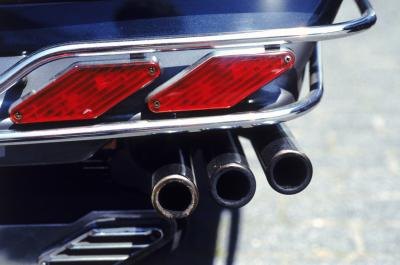Thursday, December 12, 2013
What Are the Causes of Exhaust Fumes in the Cabin of a Vehicle

If there is ever a strong smell of engine exhaust in the vehicle, it means there is an exhaust leak somewhere toward the front side of the vehicle. It is imperative to have the exhaust fixed immediately as engine exhaust contains carbon monoxide, which will poison you. If the vehicle must be driven, drive with all windows down and the heating/air conditioning turned off to limit your exposure to the noxious fumes. There are several places exhaust fumes could leak from that would find their way into the cabin.
Exhaust Manifolds
With the engine running, check the exhaust manifolds for any leaks (remember exhaust is very hot and will burn you so do not touch it until the engine has completely cooled). Potentially, there could be leaks between the exhaust manifold and the cylinder head, or the exhaust manifold and the exhaust down pipe. If leaks are found, replace the leaking gasket. Inspect the exhaust manifold for extreme corrosion; in rare cases, exhaust manifolds have been known to corrode and may need to be replaced altogether.
EGR Valve
The exhaust gas recirculation valve directs exhaust back into the intake manifold. If the EGR valve gasket has failed, it will begin to leak exhaust gas, which may find its way into the cabin. Check around the EGR valve for any gasket leak, as well as the piping leading to the EGR valve for any corrosion or damage.
Catalytic Converter and Gasket
If the catalytic converter becomes plugged, it will create intense back pressure that can cause the mating gasket between the exhaust pipe and the catalytic converter to fail and leak exhaust fumes. Even from under the car, these noxious fumes can make their way into the vehicle cabin. Check for any exhaust leaks around the mounting point between the exhaust pipe and catalytic converter.
Leaking Exhaust Pipes
Over time, exhaust pipes can corrode and develop rust holes, especially in states that use salt for ice and snow control in the winter. Visually inspect all pipe from the engine back for any extreme corrosion or damage from other road conditions and replace as necessary.
Thursday, November 21, 2013
Causes of Blown Transmission Seals

Vehicle transmissions allow a car to move through gears, resulting in a progression of speed. The complexity of the transmission unit makes it an expensive repair if any mechanical issues, such as bad seals, occur.
Function
Transmission seals are the gaskets that seal the transmission pan with the rest of the transmission body. If the gasket fails, transmission fluid can be released, causing the fluid level within the transmission to fall, possibly causing costly damage.
Causes
Transmission seals can blow, or fail, for a variety of reasons. If a gasket has aged, and has not been serviced consistently, it can crack or break completely in certain areas, allowing fluid to escape. To worsen the situation of a worn gasket, the torque converters pressure on the transmission fluid can blow out the seals as well, especially if the torque converter is malfunctioning.
Prevention/Solution
The best way to keep the transmission, and its seals, in good working order is to have consistent transmission flushes, based on the manufacturers recommendations. In addition, the seals should be inspected periodically to catch any deformities in the seal body.
Tuesday, November 5, 2013
What Causes Car Tires to Make a Humming Sound

A variety of things could cause your tires to make noise. It is important to notice at what times, what speeds and under what conditions, the noise is made.
Significance
The most common cause of a humming sound from ties is uneven tire wear. This is likely if the noise shows up after you have rotated your ties, or have not rotated them in a long time. Try rotating the tires again, if necessary, and according to manufacturers directions, which should help. Buying new tires is the other alternative.
Warning
The problem could be more serious than simple tire wear. If the sound never changes, or happens more when you change lanes, the problem could be a wheel bearing. A wheel bearing problem will be constant and more a grinding sound than a rubbing sound. Eventually, a bad wheel bearing could make your tire fall off and cause an accident.
Balance
A third possibility is the balance of the tires. An out-of-balance tire can develop "cupping," which deforms the tire and can cause it to make a sound. If balancing does not clear it up, you need new tires.